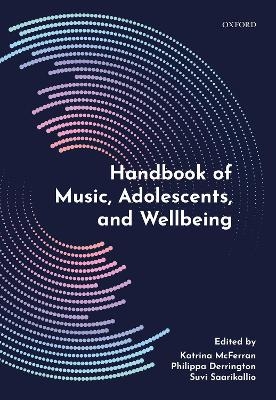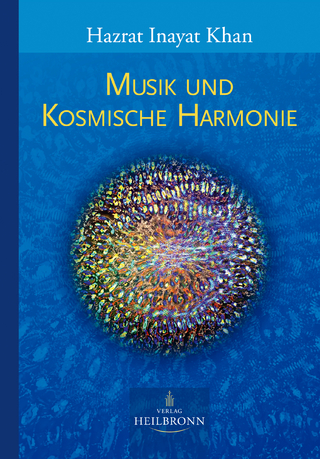
Handbook of Music, Adolescents, and Wellbeing
Oxford University Press (Verlag)
978-0-19-880899-2 (ISBN)
Many young people rely on music to guide them through the good and bad times of their lives. Whether immersing themselves in music to process emotions or creating music as a means of self-expression, it provides a powerful outlet that can help young people navigate the turbulence of adolescence.
Centred around the three key areas of emotion, identity, and connectedness, the Handbook of Music, Adolescents, and Wellbeing provides insights into the relationship between music and young people, exploring questions such as: why do teenagers have such a passionate relationship with music? Why this is even more apparent and important during times of difficulty? How can music be utilised to enhance wellbeing?
With 26 authors from around the globe, this book canvasses a wide range of perspectives, from the most scientific to the most practical. Each chapter contains insightful stories from the authors' own experiences working with young people, and brings together the latest theory, research, and practice from the fields of music therapy, music psychology, music education, and music sociology to explore and understand how and why music plays such a big part in young lives.
The first section addresses the popular topic of music and emotions, clarifying the ways that young people can learn to use music intentionally to achieve healthy outcomes. The second section looks at identity construction, emphasising agency in the ways that young people choose to express themselves both personally and to others. The third section explores connectedness, with a particular emphasis on uses of technology to connect with others.
This book will be of interest to music therapists, youth and social workers, psychologists, counsellors, occupational therapists, teachers, parents, and anyone interested in promoting adolescent wellbeing through music.
Professor Katrina McFerran is a music therapy scholar specialising in music and young people. She is Director of the National Creative Arts and Music Therapy Research Unit at the University of Melbourne in Australia, and Chair of the World Federation of Music Therapy's Research and Ethics Commission. Her research is diverse and includes collaborative and participatory approaches that seek to understand how young people can draw upon their relationships with music to feel better. She is creator of the Massive Open Online Course 'How Music Can Change Your Life' through Coursera and has created a TEDx Talk on Coming Back from the Dark Side with Music. She has also published more than 90 journal articles, 4 books and 24 book chapters and is regularly invited to speak at conferences, symposia and universities around the world. Dr Philippa Derrington has led the MSc Music Therapy programme at Queen Margaret University, Edinburgh in Scotland, UK since 2013. She has practiced as a music therapist for many years with adults, children and adolescents, and in a variety of health and education settings. She is a passionate advocate for the development and promotion of music therapy especially within mainstream schools and this continues to be her main area for research. She has published her work and presented at many conferences nationally and internationally. She also works as a clinical and research supervisor and is an editor of British Journal of Music Therapy. Dr Suvi Saarikallio specializes in music as part of adolescents' psychological development and wellbeing in everyday life. She has PhD in Music Education (2007) and Title of Docent in Psychology (2014). She conducts multidisciplinary research from music cognition to music therapy, using methods from qualitative theory development to motion capture, neural measures, and psychometrics. She has published over 50 peer-reviewed papers in journals and conference proceedings and her recent research projects have involved topics like Music-related emotional competence and adolescent mental health, (Academy of Finland 2010-2016) and Affect from Art (Kone Foundation, 2015-2017). Saarikallio currently works as a senior researcher and Vice-Head of Department (Head of Research) at the Department of Music, Art and Culture Studies and Finnish Center for Interdisciplinary Music Research, University of Jyväskylä, Finland.
Part 1. Emotions
1: Katrina McFerran: Crystallizing the Relationship between Adolescents, Music and Emotions
2: Andeline dos Santos: Group Music Therapy with Adolescents Referred for Aggression
3: Genevieve Dingle, Leah Sharman and Joel Larwood: Young People's Uses of Music for Emotional Immersion
4: Tan-Chyuan Chin: Measuring Adolescents' Emotional Responses to Music: Approaches, Challenges and Opportunities
5: Josephine Geipel: Between Down in the Dumps and Over the Moon: Music Therapy for Young people with Depression
6: Margarida Baltazar: Musical Affect Regulation in Adolescents: A Conceptual Model
7: Andreas Wölfl: Music and Violence: Working with Youth to Prevent Violence
Part 2. Identity
8: Suvi Saarikallio: Music as a resource for agency and empowerment in identity construction
9: Dave Miranda: Personality Traits and Music in Adolescence
10: Alexandra Lamont and David Hargreaves: Musical Preference and Social Identity in Adolescence
11: Tia De Nora: 'For ever piping songs for ever new': the musical teenager and musical inner teenager across the life course
12: Viggo Krüger: Music as a Structuring Resource in Identity Formation Processes by Adolescents Engaging in Music Therapy - A Case Story from a Norwegian Child Welfare Setting. 'Hey ho, let's go' (The Ramones)
13: Daphne Rickson: Working in Music with Adolescents who Experience Disability
14: Elly Scrine: Reframing Inclusivity: The Importance of Exploring Gender and Sexuality in Music Therapy with All Young People
Part 3. Connectedness
15: Philippa Derrington: 'What's the WiFi code in Here?' Connecting with Adolescents in Music Therapy
16: Susan A. O'Neill: Entangled Musical Lives: Affordances of Spaces in Young People's Music Engagement for Connectedness and Wellbeing
17: Andy Bennett and Lisa Nikulinsky: Wellbeing, Young People and Music Scenes
18: Helen Oosthuizen: 'There is a Good Spot in my Heart': A Story of a Music Therapy Group that Enables Young Sex Offenders to Reconnect with Themselves, Their Stories and Their Communities
19: Roseann Pluretti and Piotr S. Bobkowski: Social Media, Adolescent Developmental Tasks and Music
20: Michael Viega: Globalizing Adolescence: Digital Music Cultures and Music Therapy
21: Carmen Cheong-Clinch: My iPod, YouTube and Our Playlists: Connections Made In and Beyond Therapy
| Erscheinungsdatum | 16.07.2019 |
|---|---|
| Verlagsort | Oxford |
| Sprache | englisch |
| Maße | 175 x 252 mm |
| Gewicht | 616 g |
| Themenwelt | Kunst / Musik / Theater ► Musik ► Musiktheorie / Musiklehre |
| Geisteswissenschaften ► Psychologie ► Entwicklungspsychologie | |
| Medizin / Pharmazie ► Physiotherapie / Ergotherapie ► Ergotherapie | |
| ISBN-10 | 0-19-880899-2 / 0198808992 |
| ISBN-13 | 978-0-19-880899-2 / 9780198808992 |
| Zustand | Neuware |
| Informationen gemäß Produktsicherheitsverordnung (GPSR) | |
| Haben Sie eine Frage zum Produkt? |
aus dem Bereich


